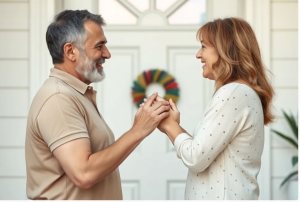In Part 1 of this series, I examined what it feels like to need your partner’s approval in order to feel okay about yourself. Here, I’ll address some of the many complicated conditions that lead to this dynamic and some guidance for outgrowing this draining and disempowering relational paradigm. As I stated in the previous post, while “codependent” is not a clinical diagnosis or recognized personality disorder, it remains a widely-used term for someone who’s self-sacrificing, a caregiver who gives at the expense of her own well-being, and who enables her partner’s addictive or self-destructive behavior.
For women particularly, early cultural conditioning plays a part in this dynamic. From the time we’re very young, we start being trained in how to be a “good girl”—to be pleasing. As such, we’re taught to be sweet, nice, generous, accommodating, and selfless. While these are all lovely qualities and certainly aspects of ourselves we want to develop, the message many girls receive is that these traits should be the whole of them, while other qualities that might not be so pleasing or caretaking are not acceptable or desirable. Simultaneously, we’re praised and valued for our ability to be selfless and take care of other people, and we should be valued for that. Still, often we’re also judged and negatively labeled for aspects of ourselves that are not so pleasing and selfless.
Over time, taking good care of other people’s needs, which we do because we want to, but also because it’s how we’ve learned to feel valuable, to be accepted and loved, can become an unhealthy and exhausting pursuit. Sometimes it becomes the only way we know how to feel worthy; we become a caretaker, a “giver”; it’s just who we are, and so we often end up in relationships with “takers.” We stop relating to ourselves as someone whose needs also matter, and feel empty when it comes to our own experience, here solely to provide for others.
Feelings of codependency can also stem from being raised in an enmeshed family or with a caregiver with poorly defined boundaries. In an enmeshed family, unhealthy relationship patterns abound, and there’s a lack of independence among family members. The family operates as one unit rather than independent parts, with each member’s well-being depending on the well-being of the others. A parent may feel the child’s feelings too intensely without a sense of healthy separateness. They are overly connected, involved, and identified with the child’s experience. As a result, love and attachment for that child become an experience of a merger, overly involved and without boundaries, rather than two separate people with their own needs knowing and loving each other. That child then grows up to be an adult dependent on her partner to feel secure inside herself.
Similarly, these feelings can arise from growing up in a family in which love and acceptance felt highly conditional or unstable. When only parts of us are welcome and lovable while other parts are rejected and unlovable, we learn to shape ourselves and become whomever our parents can love, which may not be who we really are (or only partially). The message was clear: If we wanted to be loved, we had to figure out what others needed and how to offer that. In this environment, we develop a sense of self-esteem that’s fragile and unreliable, and overly reliant on other people’s perceptions and experiences of us.
So then, how do we break free from this deeply conditioned and rooted paradigm of taking care of others at the expense of ourselves, making ourselves uncomfortable so that others can be comfortable? How do we evolve from this training to rely on others’ approval for our well-being and worthiness? How can we shift the core belief that we can’t be okay if our partner isn’t okay and heal the existential fear and anxiety that arises when the relationship is bumpy? What’s the path to feeling grounded and well, even when our relationship contains conflict?
Recovery begins, like all paths to change, with awareness, which leads to action. Part 3 soon to come…


